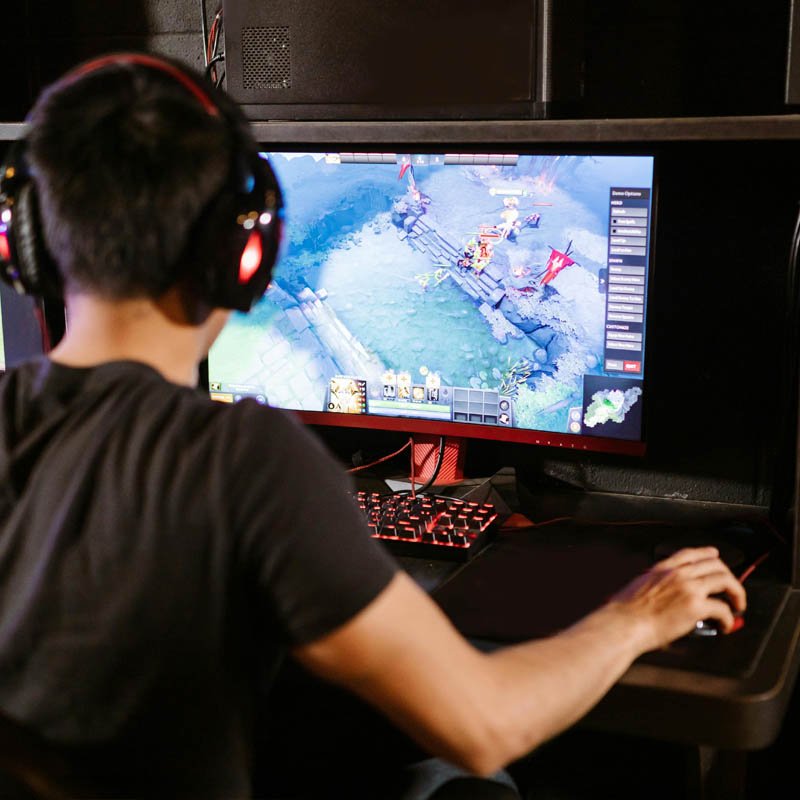In the fast-paced world of gaming, your PC can make or break your experience. Whether you’re an esports pro, a casual gamer, or someone diving into the world of PC gaming for the first time, choosing the right gaming PC is crucial. With so many options available on the market, it can be overwhelming to decide which one will meet your needs. In this guide, we’ll break down the essential factors you need to consider when buying the best gaming PC for your setup.
1. Understand Your Gaming Needs
Before you dive into specifications and pricing, it’s important to identify your gaming requirements. Not all games are created equal, and different types of games can demand different levels of hardware performance. Ask yourself:
- What games will you play?
If you’re into graphically intensive titles like Cyberpunk 2077 or Red Dead Redemption 2, you’ll need a more powerful machine than someone who mainly plays less demanding games like Fortnite or League of Legends. - Do you plan to stream or multitask?
If you’re into streaming or running multiple applications while gaming, your PC will need more processing power and RAM. Look for a system that offers strong multitasking capabilities. - What is your budget?
Gaming PCs come in a range of prices, from budget-friendly systems to high-end, top-of-the-line rigs. Setting a clear budget will help narrow down your choices.
2. Key Components to Consider
When choosing a gaming PC, there are a few core components that will determine the performance and longevity of your machine. Here’s a rundown of the most important parts:
a. CPU (Central Processing Unit)
The CPU is the brain of your computer, so its performance is key. For gaming, look for a high-performance processor from either AMD or Intel.
- Intel: Intel Core i7 or i9 processors are great for gaming, offering high clock speeds and excellent single-core performance.
- AMD: AMD Ryzen 7 or 9 series CPUs are known for their high performance, especially in multi-threaded workloads, making them perfect for gamers who also like to stream or perform heavy multitasking.
Tip: Aim for at least a quad-core processor (though 6 or 8 cores are ideal for future-proofing).
b. GPU (Graphics Processing Unit)
The GPU is arguably the most important component for gaming performance. It’s responsible for rendering the graphics in games, so a high-end graphics card can significantly boost your frame rates and visual quality.
- NVIDIA: The GeForce RTX 30-series (RTX 3060, 3070, 3080, and 3090) is great for high-quality gaming and ray tracing support. The latest RTX 40-series cards, such as the RTX 4080 and RTX 4090, offer cutting-edge performance.
- AMD: AMD’s Radeon RX 6000-series graphics cards, such as the RX 6800 XT, offer competitive performance, especially for users with a preference for AMD-based systems.
Tip: If you’re gaming at 1080p, an RTX 3060 or RX 6600 XT will be more than enough. For 1440p or 4K gaming, look at the RTX 3070 or higher for smoother performance.
c. RAM (Random Access Memory)
The more RAM your gaming PC has, the better it can handle multitasking, such as running background applications while gaming. For modern gaming, 16GB of RAM is the sweet spot, but if you’re doing heavy multitasking or streaming, 32GB is ideal.
- DDR4 is the most common type of RAM, but DDR5 is becoming more popular for higher-end systems, offering faster speeds and better overall performance.
Tip: Ensure that your motherboard supports the RAM speed you choose, as faster RAM can lead to better performance.
d. Storage (SSD vs. HDD)
Storage is another important consideration. While traditional hard drives (HDDs) offer more storage space for less money, solid-state drives (SSDs) are much faster, improving game load times and system responsiveness.
- SSD: Aim for a 1TB SSD for your operating system and favorite games. This will drastically reduce loading times and make your system feel more responsive.
- HDD: If you need additional storage for non-essential files or older games, an HDD with 2TB or more is a good secondary option.
Tip: Choose a system with at least a 512GB SSD for faster boot times and game loading.
e. Cooling System
Gaming PCs can generate a lot of heat, especially when you’re playing demanding titles. A good cooling system is essential to ensure that your PC runs smoothly and doesn’t overheat.
- Air cooling: Affordable and effective for mid-range systems.
- Liquid cooling: Offers better cooling performance, especially for overclocked systems or high-end gaming setups.
Tip: Ensure your case has adequate airflow, with fans positioned to direct airflow from front to back.
f. Power Supply (PSU)
A reliable power supply is crucial to ensuring your system runs without hiccups. Choose a PSU with enough wattage to support your components, especially your GPU and CPU.
- For most gaming systems, a 650W to 750W PSU will suffice. However, if you’re running multiple GPUs or very high-end hardware, you may need 850W or higher.
Tip: Make sure to select a PSU with an 80+ Bronze or higher certification for better efficiency.
3. Prebuilt vs. Custom Build
When purchasing a gaming PC, you’ll often have the choice between a prebuilt system or a custom-built PC.
- Prebuilt PCs: These are convenient because they come fully assembled and ready to go. Brands like Alienware, ASUS ROG, and Corsair offer some of the best prebuilt gaming systems on the market.
- Pros: Convenience, warranty, and support.
- Cons: May cost more for similar specs compared to custom-built systems.
- Custom-built PCs: If you’re willing to build the PC yourself or work with a builder, custom PCs allow you to choose every component and often offer better value for the same performance.
- Pros: Flexibility, value for money, personal customization.
- Cons: Time-consuming and requires more technical knowledge.
Tip: If you’re new to PC building, buying a prebuilt gaming PC can save time and effort. However, if you’re confident with PC hardware, building your own rig can offer more flexibility and cost savings.
4. Monitor and Peripherals
While focusing on the PC itself, don’t forget about your monitor, keyboard, mouse, and headset, as these can drastically affect your overall gaming experience.
- Monitor: Choose a monitor with at least a 144Hz refresh rate for smooth gameplay. For fast-paced competitive games, you may want to go for 240Hz. Additionally, consider a 1440p or 4K monitor depending on your GPU’s capabilities.
- Keyboard/Mouse: Mechanical keyboards and high-DPI gaming mice are preferred for their precision and responsiveness.
5. Future-Proofing Your PC
The gaming landscape is constantly evolving, with new and more demanding titles being released every year. When purchasing your gaming PC, it’s important to consider future-proofing.
- Upgradable components: Choose a system that allows for easy upgrades, such as a motherboard with additional RAM slots or a case with space for more storage.
- Warranties and support: Opt for a system that comes with solid warranty support, especially if you’re buying a prebuilt PC.

